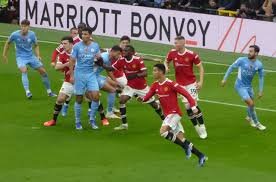The upcoming All-Manchester FA Cup final between Manchester United and Manchester City marks a significant chapter in the storied rivalry between the two clubs. The history of this fierce competition dates back to their first encounter in 1881, when the rivalry was relatively calmer. However, as the years went by, United emerged as the dominant force while City fluctuated in the lower divisions.
During the tenure of Sir Alex Ferguson, United experienced unprecedented success, particularly from the 1990s to the mid-2000s. Meanwhile, City struggled to match their achievements and even faced relegation. The gulf between the two sides was palpable, with United having won the treble just the previous season. However, football has a way of surprising us, and unexpected events can shape rivalries.
One such moment occurred during the 1973-74 season when Denis Law, a revered figure in Manchester United’s history, scored a famous backheel goal for Manchester City. In hindsight, United would still have been relegated even without Law’s goal, but it became mythologized and added fuel to the already intense rivalry between the two clubs. Law’s goal is often considered one of the factors that intensified the competition between Newton Heath (United) and St Marks (City), who eventually transformed into the legendary teams we see today.
Another incident that fueled the rivalry took place in the 2000/01 season during a Manchester derby at Old Trafford. United legend Roy Keane made a horror tackle on City’s Alfie Haaland, breaking his leg. This incident was a culmination of the animosity between the two players, as Haaland had previously injured Keane in 1997. The rivalry was reignited, and the clashes between United and City became even more intense.
While City showed promise by defeating United on several occasions, they struggled to match the success enjoyed by their rivals. However, a significant turning point came in 2008 when City was acquired by Abu Dhabi United Group, backed by Sheikh Mansour Bin Zayed Al Nahyan. This marked a shift in the power dynamic between the two clubs. With substantial financial backing, City could attract notable players and make ambitious signings.
One of the notable transfers was snatching Carlos Tevez from Manchester United. Tevez played a crucial role in United’s UEFA Champions League and Premier League-winning team, but he opted to join City instead of accepting United’s permanent deal. City still lost their first derby with Tevez in their ranks, but the gap between the two teams began to narrow.
The 2011-2012 season witnessed an intense title race between United and City. On the final day, Sergio Aguero’s goal against QPR secured a 3-2 victory for City and the Premier League title on goal difference. This iconic moment, accompanied by commentator Martin Tyler’s exclamation of “Aguerroooooooo,” has become ingrained in Premier League folklore. City had announced their arrival as a genuine force in English football.
Since the arrival of Pep Guardiola as the coach, City has dominated English football, winning five league titles in six seasons and achieving three consecutive Premier League victories—a feat last accomplished by United. Guardiola has transformed City into a formidable and well-oiled machine, setting new standards of excellence.
However, the upcoming FA Cup final provides Manchester United, now under Erik Ten Hag, with an opportunity to deny Guardiola’s team a shot at immortality. Having recently ended a six-year trophy drought with a League Cup win, United will be determined to thwart City’s ambitions of securing a historic treble. The power dynamic between the two clubs may shift once again, and fans eagerly await the outcome of this ever-evolving clash.
In conclusion, the history of the Manchester derby is steeped in fierce competition, iconic moments, and a shifting


